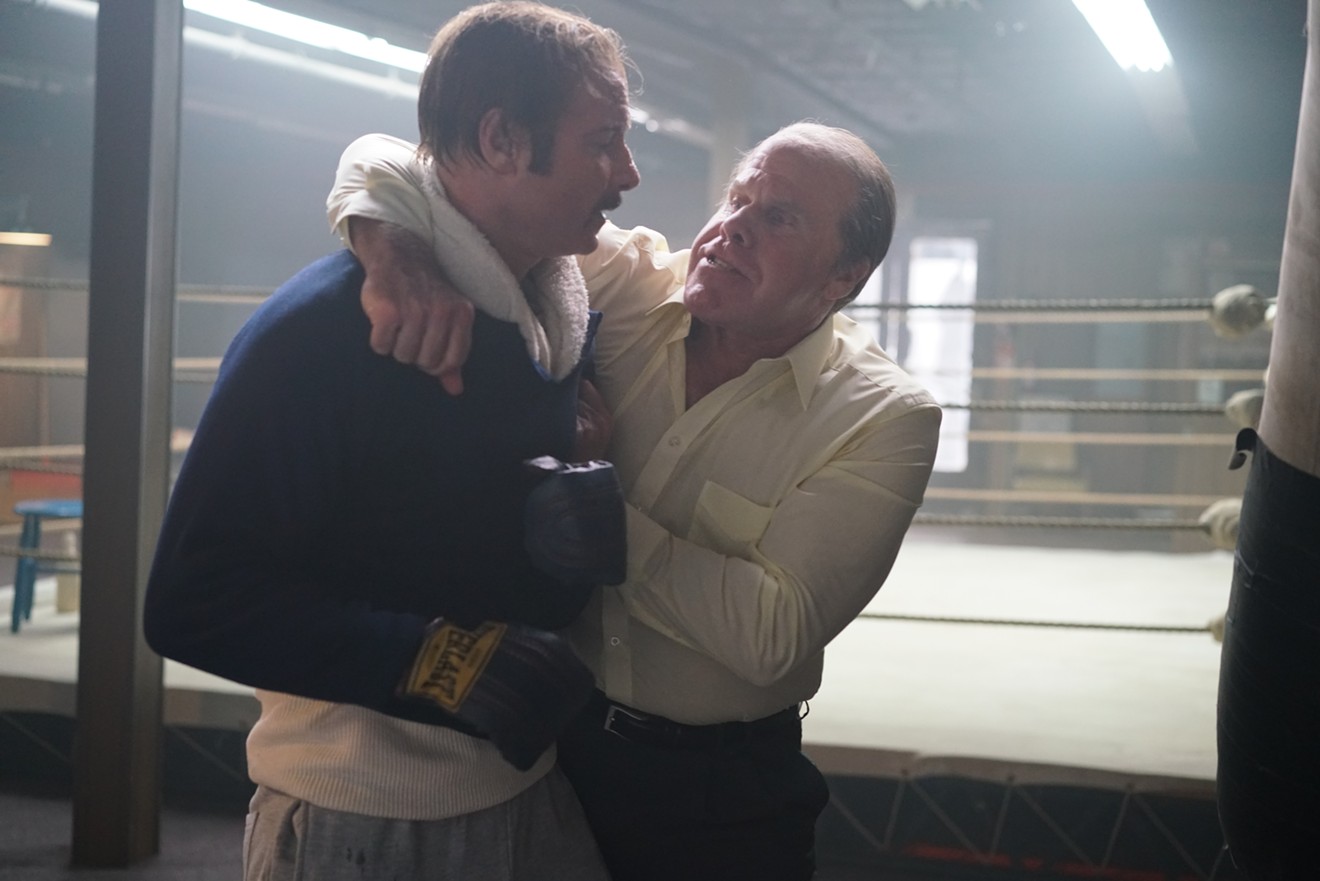Heavyweight almost-champ Chuck Wepner was a character long before he inspired Sylvester Stallone to pen Rocky. But Wepner is no Rocky Balboa. Sure, he comes from a working-class town (Bayonne, New Jersey), and when he boxed, he took a good punch, bled like a hemophiliac and dreamed of taking home that giant gold belt. But Stallone gleaned only what he wanted from the gentle giant — who, at his prefight press conference with Muhammad Ali, read a poem he had written — and left out the messy human bits, such as Wepner’s flagrant philandering and his obstinance.
In Chuck, director Philippe Falardeau attempts to repair that dissonance, stitching up the two competing sides of the real-life boxer into a whole human. The result is a meta-biopic: This is supposed to be the true story behind Rocky, but the reality of Wepner’s life — or how he tells it, at least — is still the stuff of Hollywood movies, though this time it’s a comedy, driven by a knockout lead performance from Liev Schreiber.
The film opens with Chuck getting suited up in the backroom of a bar. His opponent is a literal bear. Schreiber contorts his face, looking past the glaring ring lights into the crowd — Jesus Christ, is this what it’s come to? Through voiceover, we travel back in time — before the bear, before Rocky, before his first wife, Phyliss (Elisabeth Moss), leaves him — to when he was just the “Bleeder from Bayonne,” jogging up the block to a bar, where everyone saw his mashed-potato face and wanted to buy him a drink.
In the beginning, Chuck’s a romantic. He leaves little juvenile rhyming poems scrawled on bar napkins on the fridge for Phyliss, and the two seem like one of those perfect push-and-pull couples, the guy a lovable cad, the woman rolling her eyes and punching his hulking arm in jest. But after Ali KOs George Foreman — Chuck’s only real chance at the title would have been fighting that match’s slower loser — Phyliss follows her husband to a café, where he’s entertaining a pretty blonde. “You look at him like he’s something special, and he’ll fall in love with you,” she says to the other woman. That’s the first of many jabs into Chuck’s good-guy image, and it’s sometimes difficult to have sympathy for him, but Schreiber’s a convincing enough naïf to make it work.
Chuck eventually gets to box Ali (Pooch Hall), going 15 rounds against the champ — which turns out to be his undoing. Stallone (Morgan Spector) catches wind of his story and makes his film, and whatever pipe-dream hopes Chuck had before are now amplified to the nth degree. He used to want to fight, but now he just wants to be famous and snort bumps and disco dance and get cast in Rocky II.
The scene in which Chuck auditions with Sly for a role has disaster written all over it. Chuck is boozed and high, his frenetic energy flooding the contained space of a Hollywood casting room. They read a line, and Chuck stumbles over every word. Stallone tells him, “You got this. Just be yourself.” But that’s the crux of this film: This is his self. Chuck is a philandering heel on the one hand, and a boxer with a heart of gold on the other; Stallone never saw that. The sensitive soul in Rocky, that was Chuck. But it wasn’t all of him.
The best scene comes later, when Chuck is in prison for being a too-trusting drug dealer, and Stallone happens to be there filming Lock Up. Stallone requests a visit with his old buddy, but Chuck takes one look at the film crew and turns around. “Yeah, no, I’m good,” he says. It’s interesting that the most compelling parts of this film are the ones that convey how a taste of Hollywood can destroy a life, since this is yet another Hollywood film about that life. Let’s hope this one doesn’t do the real Chuck, now 78, more damage.
[
{
"name": "Air - MediumRectangle - Inline Content - Mobile Display Size",
"component": "18478561",
"insertPoint": "2",
"requiredCountToDisplay": "2"
},{
"name": "Editor Picks",
"component": "16759093",
"insertPoint": "4",
"requiredCountToDisplay": "1"
},{
"name": "Inline Links",
"component": "17980324",
"insertPoint": "8th",
"startingPoint": 8,
"requiredCountToDisplay": "7",
"maxInsertions": 25
},{
"name": "Air - MediumRectangle - Combo - Inline Content",
"component": "16759092",
"insertPoint": "8th",
"startingPoint": 8,
"requiredCountToDisplay": "7",
"maxInsertions": 25
},{
"name": "Inline Links",
"component": "17980324",
"insertPoint": "8th",
"startingPoint": 12,
"requiredCountToDisplay": "11",
"maxInsertions": 24
},{
"name": "Air - Leaderboard Tower - Combo - Inline Content",
"component": "16759094",
"insertPoint": "8th",
"startingPoint": 12,
"requiredCountToDisplay": "11",
"maxInsertions": 24
}
]











